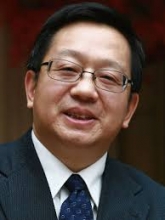CEE Seminar: Multiscale Characterization and Dynamic Crack Propagation of Shale

Dean and Professor, College of Engineering, Peking University
Distinguished Visiting Professor, UC Irvine
Abstract: Shale is a fine-grained, clastic sedimentary rock composed of clay minerals and quartz grain. There are increasingly intensive interests in characterizing this type of rock for both shale oil/gas production (as a source and reservoir rock) and geological carbon sequestration (as a caprock). Gas transport mechanism in the extremely tight matrix of shale is one of the most critical issues, which constitutes the theoretical basis of assessment of shale gas resources and carbon sequestration capacity as well as prediction of long-term gas productivity and carbon sequestration viability. However, as a complex issue of multiscale and multiphysics processes, microscopic mechanisms are not yet well understood and remain as a major challenging topic. In this study, a systematic investigation of multiscale pore structure in shale by means of the combination of various imaging techniques is presented, including the state-of-the-art Helium-Ion-Microscope. The study achieves insight into the major features at each scale and provides valuable information, from the microscopic perspective of pore structure, for understanding how gas accumulates and transports from where it is generated. A comprehensive workflow is proposed based on the characteristics acquired from the multiscale pore structure analysis to simulate the gas transport process. Also presented is the fracture behavior of shale, which is critical for both shale oil/gas production and geological carbon sequestration. We combine scanning electron microscope, microfabrication method, and in situ fracture experiments to research crack propagation in three representative test areas with different dominant constituents. The crack propagation process is clearly characterized at micrometer scale in shale for the first time.
Bio: Don Zhang is a professor and dean of the College of Engineering at Peking University, Beijing, China. He is a member of the U.S. National Academy of Engineering, an honorary member of the Society of Petroleum Engineers and a fellow of the Geological Society of America. He has held positions as senior scientist at Los Alamos National Laboratory, as the Miller Chair Professor at the Department of Petroleum and Geological Engineering at University of Oklahoma, and as a Chair Professor at USC. He has authored two books and published over 170 peer-reviewed papers. He earned both his master’s degree and doctorate in hydrology and water resources in 1992 and 1993, respectively, from the University of Arizona. Zhang is an internationally well-known expert in unconventional oil and gas production, groundwater hydrology and geological carbon sequestration. His research achievements in stochastic modeling, numerical simulation, inverse modeling and machine learning are widely adopted by his peers. He has served as a panelist or member on the UK Research Councils Review of Energy, the U.S. National Research Council’s Committee on New Research Opportunities in the Earth Sciences, and the World Economic Forum Global Agenda Council on New Energy Architecture.
Share
Upcoming Events
-
MAE 298 SEMINAR: Technology Developments for FIR Bolometric Detector Focal Plane Assemblies
-
CBE 298 Seminar: The Wisdom of the Crowd: Watching Bacterial Collectives (Re)shape Themselves
-
CEE Seminar: BIM and the Digital Twin
-
MSE Special Seminar: Revolutionizing Battery Technology - Engineering Quantum Materials for Enhanced Safety and Performance in Solid Electrolytes
-
MSE Special Seminar: Designing Sustainable Soft Matter from the Molecule Up
